The Houthi movement launched an anti-ship ballistic missile that struck and disabled the UK-owned, Belize-flagged Rubymar cargo ship in the Bab al Mandeb strait on February 18.[i] The Rubymar’s Lebanon-based management company said that the vessel took on water after the missile struck the vessel’s engine room.[ii] The Houthi military spokesperson claimed that the cargo vessel had completely sunk about 22 hours after the attack occurred.[iii] Neither the UK Maritime Trade Operations (UKMTO) nor CENTCOM has said that the Rubymar sunk. A warship operating under the auspices of Operation Prosperity Guardian and a commercial vessel responded to the attack.[iv] The commercial vessel evacuated the Rubymar’s crew to Djibouti.[v] This incident marks the first time that a crew has had to abandon ship after a Houthi attack since Houthi attacks began during this round of escalation on November 19.[vi] The Houthi military spokesperson falsely claimed that the Houthis ”made sure that the ship’s crew exited safely.”[vii]
The Houthi movement claimed two attacks targeting a US-owned, Greece-flagged vessel and a Marshall-Islands flagged vessel in the Gulf of Aden on February 19.[viii] The Houthi military spokesperson claimed that the Houthis fired anti-ship missiles at the US-owned and Greece-flagged Sea Champion and the Marshall Islands-flagged Navis Fortuna. The spokesperson said that the ships were both ”American.”[ix] The UKMTO reported two explosions lightly damaged one vessel 100 NM east of Aden.[x] British maritime security firm Ambrey said that the Sea Champion was “involved“ in the two explosions.[xi]
The Houthi movement claimed that it shot down a US MQ-9 Reaper drone over Hudaydah on February 19.[xii] The group posted a video showing Houthi surface-to-air missile hitting the drone.[xiii] The video also showed the drone’s wreckage. The Houthi military spokesperson did not specify what type of missile system the Houthis used to shoot down the drone. Two US officials told the New York Times that the Pentagon is investigating the cause of the drone ”crash.”[xiv] An unspecified US official told Voice of America that the Houthis previously shot down a Reaper drone over Yemen in early November 2023.[xv]
Local Houthi-affiliated media reported that US forces conducted a strike against an unspecified target in al Jabbana, Hudaydah Province. The Houthi movement spokesperson condemned US and UK strikes against Houthi targets near the time of the incident.[xvi] CENTCOM has not confirmed the airstrike.
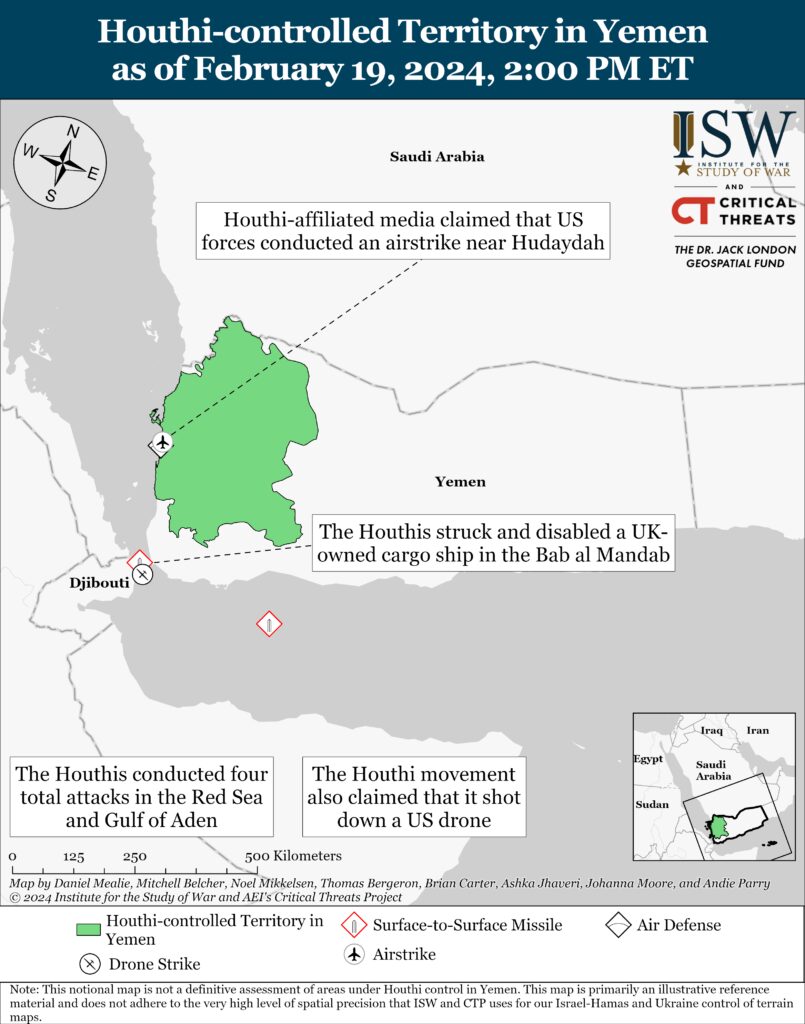
Key Takeaways:
- Yemen: The Houthi movement launched an anti-ship ballistic missile that struck and disabled the UK-owned, Belize-flagged Rubymar cargo ship in the Bab al Mandeb strait on February 18. This incident marks the first time that a crew has had to abandon ship after a Houthi attack since Houthi attacks began during this round of escalation on November 19.
- Northern Gaza Strip: Israeli forces are constructing a road in the Gaza Strip to divide the northern Gaza Strip from the southern Strip and facilitate Israeli raids. An IDF battalion commander working on the road said that Israeli forces will use the road to protect the area and control the flow of Gazans from north to south.
- Southern Gaza Strip: The IDF reported that Israeli forces are finishing clearing operation in western Khan Younis.
- Negotiations: The Qatari prime minister said that a ceasefire agreement between Israel and Hamas should not require a hostage deal.
- Palestinian Politics: Russia invited Palestinian factions, including Hamas and PIJ, to meet in Moscow on February 26 for an “inter-Palestinian meeting.” The Palestinian Authority (PA) Prime Minister Mohammad Shtayyeh said that the PA will see if Hamas “is ready to reach an understanding.”
- Lebanon: The IAF conducted airstrikes that targeted two “Hezbollah military depots” near Sidon, Lebanon on February 19. This is the first time since October 7 Israel has conducted airstrikes in Sidon, which is roughly 30km north of the Litani River and 40km south of Beirut.
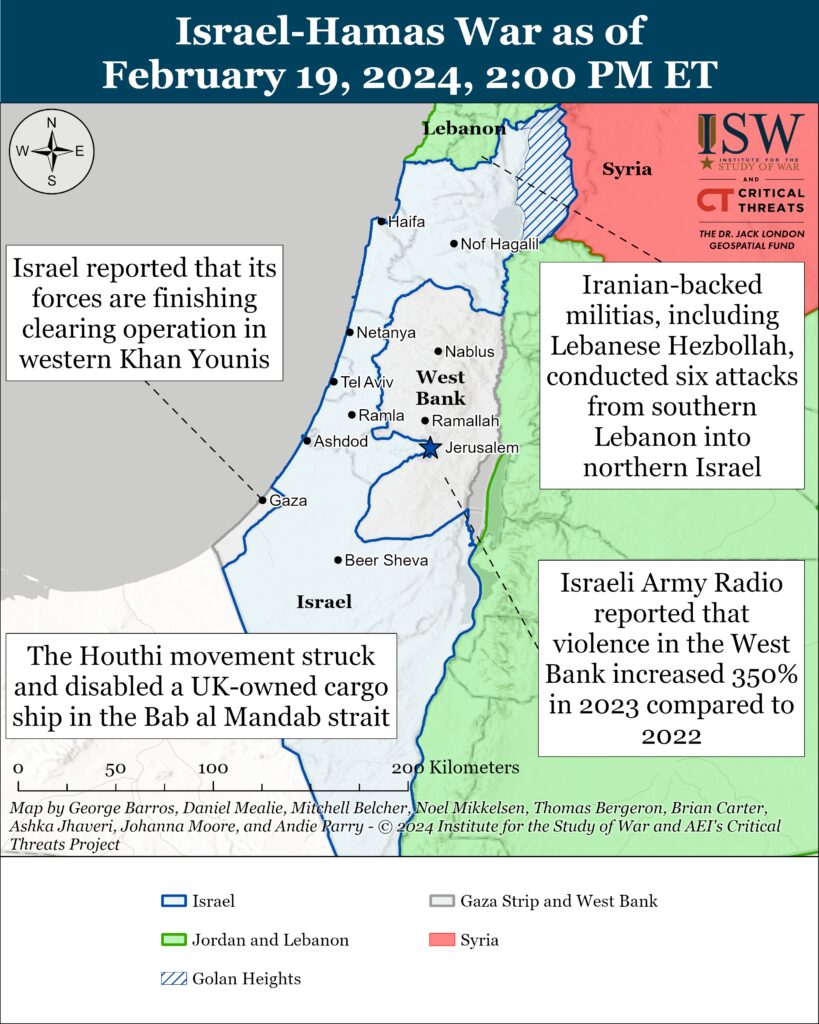
Gaza Strip
Axis of Resistance campaign objectives:
Erode the will of the Israeli political establishment and public to launch and sustain a major ground operation into the Gaza Strip
Degrade IDF material and morale around the Gaza Strip.Israeli forces are constructing a road in the Gaza Strip to divide the northern Gaza Strip from the southern Strip and facilitate Israeli raids.[xvii] An Israeli journalist embedded with the Israel Defense Forces (IDF) to observe the IDF’s construction of the new road. An IDF battalion commander working on the road said that Israeli forces will use the road to protect the area and control the flow of Gazans from north to south. The journalist reported that “the IDF was preparing for a very long stay” near the road.[xviii] Palestinian fighters have been infiltrating the northern Gaza Strip since early January and attempting to reconstitute their military capabilities and rebuild a governance system there.[xix] Hamas’ return to providing services in areas that Israeli forces previously cleared undermines Israeli efforts to destroy Hamas.
Palestinian militias attempted to disrupt Israeli operations in the northern Gaza Strip on February 19. Palestinian Islamic Jihad (PIJ) fighters fired rockets targeting Israeli forces in southern Gaza City, where the IDF are constructing the new dividing road.[xx] Hamas and Palestinian Mujahideen Movement fighters conducted combined attacks using man-portable air defense systems to target Israeli drones and helicopters in southwestern Gaza City.[xxi] The Palestinian Mujahideen Movement is a Palestinian faction aligned with Hamas that has expressed close ties with Iran. Other Palestinian militias fired rockets targeting an IDF supply line and Israeli forces in the northern Gaza Strip.[xxii]
The IDF Nahal Brigade (assigned to the 162nd Division) identified and killed a Palestinian fighter in Gaza City after the fighter fired a rocket from the central Gaza Strip into Israel.[xxiii]
The IDF reported that Israeli forces are finishing clearing operation in western Khan Younis.[xxiv] Israeli forces “expanded” ground operations in western Khan Younis on January 22 and have engaged Palestinian militias there on a near-daily basis since.[xxv] Three IDF brigades are operating in western Khan Younis to target Hamas’ battalion in the area and destroy military infrastructure.[xxvi] Israeli forces used a drone to identify a Palestinian militia cell approaching their position in western Khan Younis on February 19 and directed an airstrike to target the cell.[xxvii]
The Democratic Front for the Liberation of Palestine, a leftist Palestinian militia aligned with Hamas in the current war, detonated an unspecified explosive device and fired a rocket-propelled grenade targeting Israeli armor near Nasser Hospital.[xxviii] Hamas fighters returned from ”areas of fighting” in western Khan Younis and reported that they targeted 15 Israeli soldiers inside a house.[xxix] These fighters’ inability to communicate with higher headquarters until returning to rear areas indicates that their commanders may be unable to transmit orders to fighters engaged with the IDF. Several other Palestinian militia groups experienced similar delays in reporting as Israeli forces advanced across the Gaza Strip.[xxx]
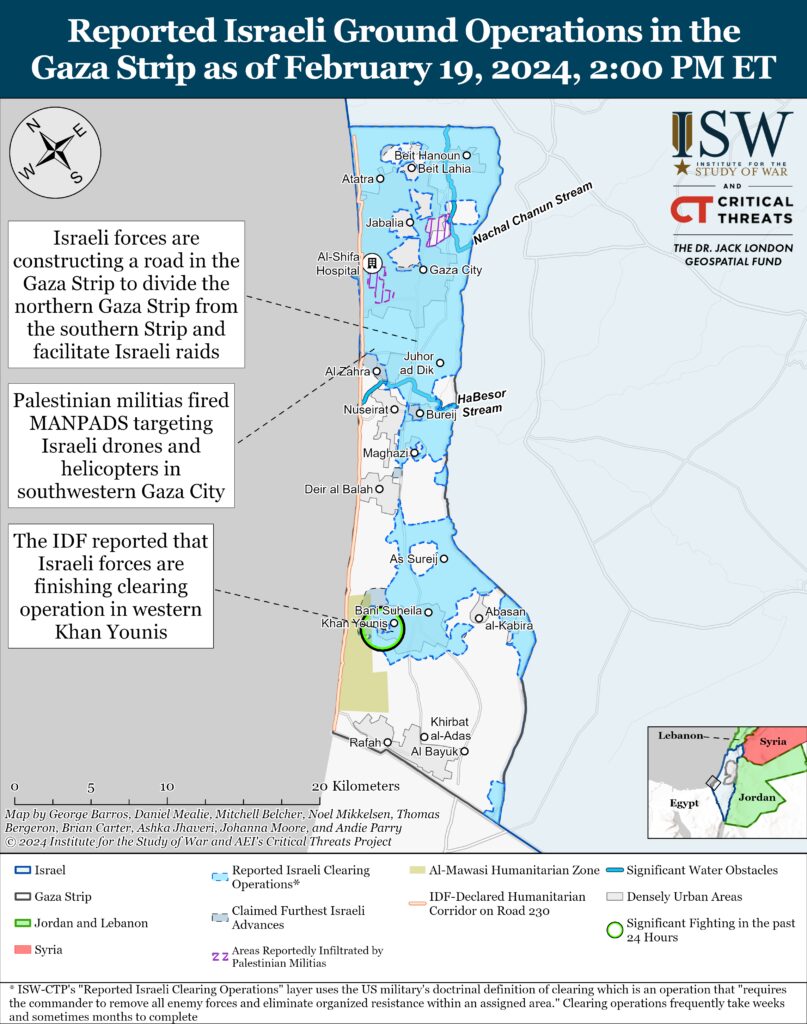
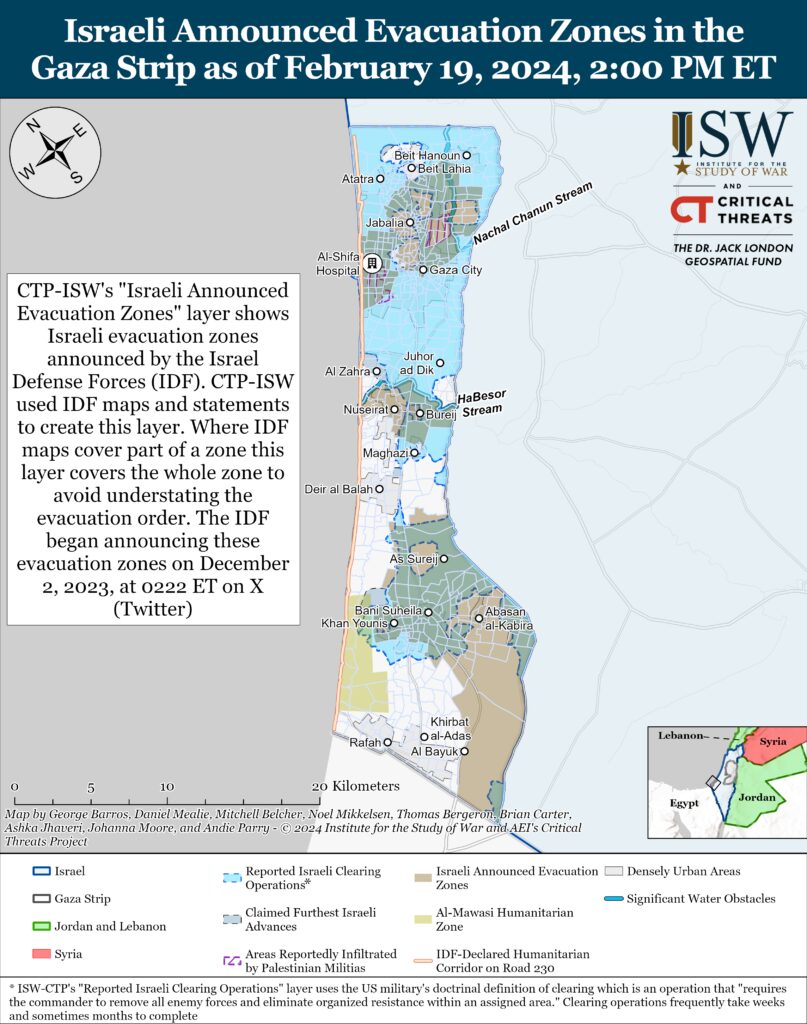
Russia invited Palestinian factions, including Hamas and PIJ, to meet in Moscow on February 26 for an “inter-Palestinian meeting.”[xxxi] Russian Deputy Foreign Affairs Minister and Special Representative for the Middle East Mikhail Bogdanov told Russian media on February 18 that Russia invited Palestinian factions that are based in different countries, including Syria and Lebanon. Bogdanov did not provide any additional details about the purpose of the meeting.[xxxii] The Palestinian Authority (PA) Prime Minister Mohammad Shtayyeh said that the PA will see if Hamas “is ready to reach an understanding.“[xxxiii] A senior Hamas delegation last traveled to Moscow in late October 2023 to meet with Russian and Iranian officials.[xxxiv] Hamas praised Russia’s stance toward the Israel-Hamas war after the meeting.[xxxv] Russia has framed itself as a possible mediator between Israel and Hamas.[xxxvi]
The Qatari prime minister said that a ceasefire agreement between Israel and Hamas should not require a hostage deal.[xxxvii] Prime Minister Mohammed bin Abdulrahman bin Jassim al Thani said that some unspecified countries believe that a hostage deal must be a condition of a ceasefire deal. Thani spoke at the Munich Security Conference on February 17, emphasizing the need to end the war. One of Israel’s stated war objectives is to recover the Hamas-held hostages from the Gaza Strip. Israel-Hamas negotiations have largely stalled since Israeli Prime Minister Benjamin Netanyahu declined to send an Israeli delegation to Cairo for follow-up talks on February 14. Netanyahu refused to send a new delegation because Hamas demanded that Israel release thousands of Palestinian prisoners as part of the hostage deal.[xxxviii]
Palestinian militias did not conduct indirect fire attacks into southern Israel from the Gaza Strip on February 19.
West Bank
Axis of Resistance campaign objectives:
Draw IDF assets and resources toward the West Bank and fix them thereIsraeli forces clashed with Palestinian fighters six times in the West Bank on February 1 Unspecified Palestinian fighters threw an explosive device at a car northwest of Nablus that was operated by an Israeli civilian.[xl] The attack injured one person.
Israeli Army Radio reported that violence in the West Bank increased 350% in 2023 compared to 2022.[xli] The IDF recorded 608 shooting, stabbing, explosive, and vehicle ramming attacks in 2023 compared to 170 attacks in 2022.[xlii] Three hundred shooting attacks took place in 2023, which is the highest number of shootings recorded since the Second Intifada in the early 2000s. The report did not specify how many attacks occurred after October 7. Hamas, the Popular Front for the Liberation of Palestine, and other Palestinian militia groups have repeatedly called for violent attacks targeting Israeli security forces and Israeli settlers in the West Bank since October 7
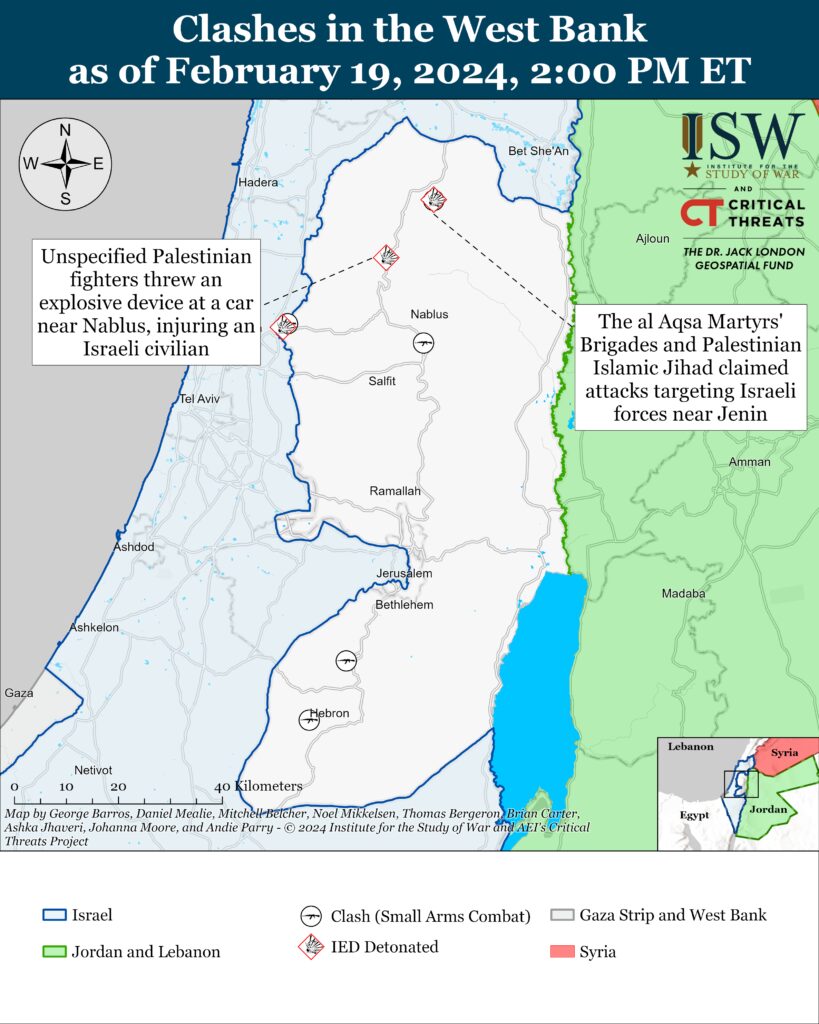
This map is not an exhaustive depiction of clashes and demonstrations in the West Bank.
Southern Lebanon and Golan Heights
Axis of Resistance campaign objectives:
Draw IDF assets and resources toward northern Israel and fix them there
Set conditions for successive campaigns into northern IsraelIranian-backed militias, including Lebanese Hezbollah, conducted six attacks from southern Lebanon into northern Israel on February 19 Lebanese Hezbollah claimed three attacks targeting IDF positions along the Israel-Lebanon border.[xlv]
The IAF conducted airstrikes that targeted two “Hezbollah military depots” near Sidon, Lebanon on February 19.[xlvi] This is the first time since October 7 Israel has conducted airstrikes in Sidon, which is roughly 30km north of the Litani River and 40km south of Beirut.[xlvii] A Reuters journalist reported that the IDF has conducted airstrikes further north into Lebanon at a higher frequency in recent weeks.[xlviii]
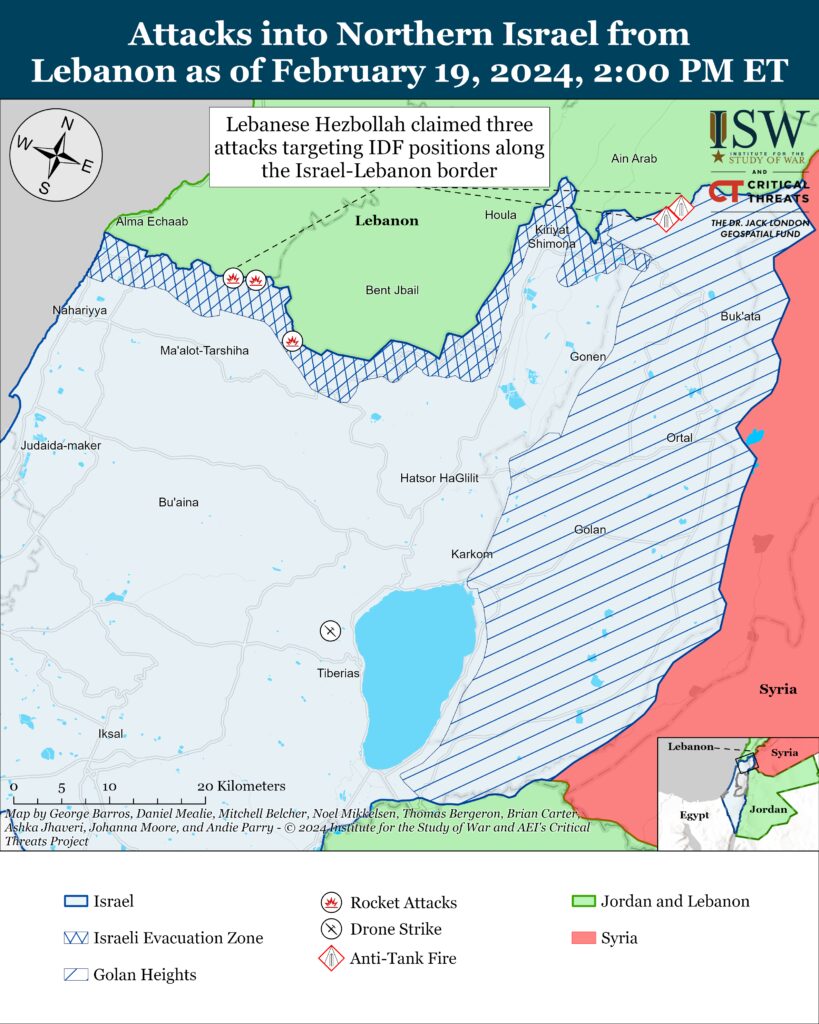
Recorded reports of attacks; CTP-ISW cannot independently verify impact.
Iran and Axis of Resistance
Axis of Resistance campaign objectives:
Demonstrate the capability and willingness of Iran and the Axis of Resistance to escalate against the United States and Israel on multiple fronts
Set conditions to fight a regional war on multiple frontsHouthi President Mahdi al Mashat issued a decree declaring the United States and the United Kingdom “enemy states of Yemen” on February 19 for their support of Israel.[xlix] The decree states that Houthi forces should confront the United States and United Kingdom. Houthi attacks have consistently targeted US and UK interests prior to the declaration, however. Most Houthi attack claims now allege that the attacks’ targets are US or UK shipping. The Houthis increased claims focusing on ”US or UK shipping” after combined US-UK airstrikes began targeting Houthi positions in Yemen in early January. Houthi attacks prior to early January framed most attacks as targeting Israeli-associated assets. The Houthis fire missiles and drones targeting ships without ties to the United States, United Kingdom or Israel. The Houthis attacked a Marshall Islands-flagged cargo ship transporting corn from Brazil to Iran on February 12, for example.[l]
The European Council launched a Greek-led, defensive naval coalition to protect commercial vessels from Houthi attacks in the Red Sea and Gulf of Aden. The coalition, dubbed Operation Aspides, will be based out of Larissa, Greece and commanded by Greece. The EU mission will not take part in any military strikes and will only operate to provide “maritime situation awareness, accompany vessels, and protect them against attacks” at sea.[li]
Western media reported on February 19 that Iranian-backed Shia Afghan militias fighters expressed “anger and frustration” at the Islamic Revolutionary Guards Corps (IRGC)’s treatment of casualties within their ranks.[lii] US airstrikes killed at least 12 fighters in the Fatemiyoun, an Iranian-backed Shia Afghan militia, in Syria on February 2. The New York Times reported that Fatemiyoun members and other unspecified Afghans were angered and frustrated because the IRGC was ”silent” on the deaths of the Fatemiyoun fighters. Fatemiyoun members and other Afghans on pro-Fatemiyoun social media channels ”questioned” the lack of IRGC acknowledgement of the Fatemiyoun casualties, with some suggesting that the IRGC Quds Forces discriminated against the Afghans. The IRGC ordinarily acknowledges or threatens to avenge the death of its own members. Local Iranian officials, clerics, and an unspecified IRGC representative attended some of the funeral ceremonies inside Iran for the Fatemiyoun fighters who were killed in Syria. Iran evacuated IRGC personnel from its military facilities in Syria but kept Fatemiyoun fighters stationed at those facilities ahead of the US strikes on February 2.[liii]
The IDF Air Force said that it has conducted a series of strikes targeting Iranian, Lebanese Hezbollah, and Syrian targets inside Syria since the start of the Israel-Hamas war.[liv] The IDF previously reported on February 3 that it had conducted a series of airstrikes targeting more than 50 Hezbollah and Hezbollah-affiliated targets in Syria since the start of the war.
 Eurasia Press & News
Eurasia Press & News



